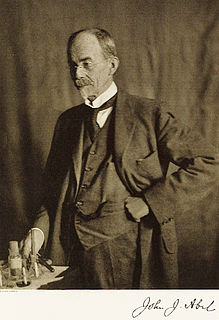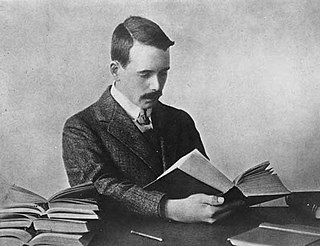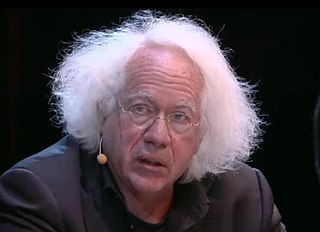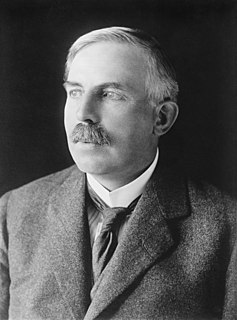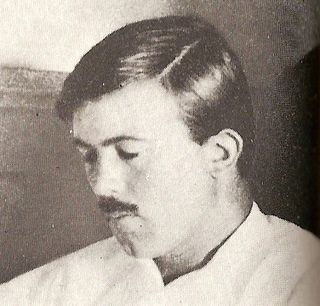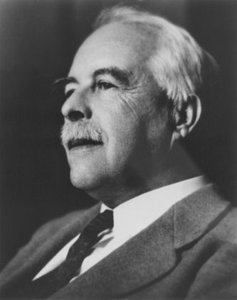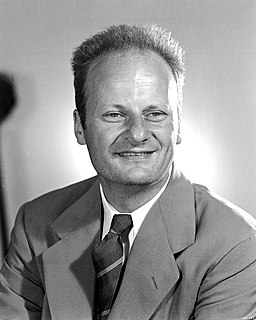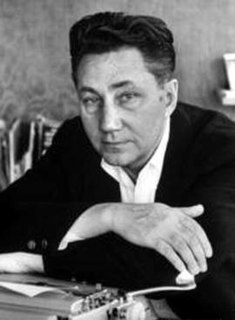Top 456 Atoms Quotes & Sayings - Page 7
Explore popular Atoms quotes.
Last updated on December 4, 2024.
As soon as we touch the complex processes that go on in a living thing, be it plant or animal, we are at once forced to use the methods of this science [chemistry]. No longer will the microscope, the kymograph, the scalpel avail for the complete solution of the problem. For the further analysis of these phenomena which are in flux and flow, the investigator must associate himself with those who have labored in fields where molecules and atoms, rather than multicellular tissues or even unicellular organisms, are the units of study.
For the better part of my last semester at Garden City High, I constructed a physical pendulum and used it to make a "precision" measurement of gravity. The years of experience building things taught me skills that were directly applicable to the construction of the pendulum. Twenty-five years later, I was to develop a refined version of this measurement using laser-cooled atoms in an atomic fountain interferometer.
The mystery of sound is mysticism; the harmony of life is religion. The knowledge of vibrations is metaphysics, the analysis of atoms is science, and their harmonious grouping is art. The rhythm of form is poetry, and the rhythm of sound is music. This shows that music is the art of arts and the science of allsciences; and it contains the fountain of all knowledge within itself.
Leibniz accepted the argument that there must be indestructible simple entities if there is to be a complex world, but Epicurean morals and politics and anti-theology dismayed him. His 'monadology' which said that the true atoms of nature were unextended 'living mirrors,' was an imaginative and beautiful system, and even in many ways more modern than Epicurean atomism, than Epicurean atomism, but there was a reactionary aspect to it.
The gross and net result of it is that people who spend most of their natural lives riding iron bicycles over the rocky roadsteads of this parish get their personalities mixed up with the personalities of their bicycle as a result of the interchanging of the atoms of each of them and you would be surprised at the number of people in these parts who nearly are half people and half bicycles.
You sharpen the human appetite to the point where it can split atoms with its desire; you build egos the size of cathedrals; fiber-optically connect the world to every eager impulse; grease even the dullest dreams with these dollar-green, gold-plated fantasies, until every human becomes an aspiring emperor, becomes his own God... and where can you go from there?
Poets say science takes away from the beauty of stars-mere globs of gas atoms. Nothing is "mere". I too see the stars on a desert night, and feel them. But do I see less or more? ...What is the pattern, or the meaning, or the why? It does not do harm to the mystery to know a little more about it. For far more marvelous is the truth than any artists of the past imagined it.
Man's destiny was no longer determined from 'above' by a super-human wisdom and will, but from 'below' by the sub-human agencies of glands, genes, atoms, or waves of probability. ...they could determine his fate, but could provide him with no moral guidance, no values and meaning. A puppet of the Gods is a tragic figure, a puppet suspended on his chromosomes is merely grotesque.
We may, I believe, anticipate that the chemist of the future who is interested in the structure of proteins, nucleic acids, polysaccharides, and other complex substances with high molecular weight will come to rely upon a new structural chemistry, involving precise geometrical relationships among the atoms in the molecules and the rigorous application of the new structural principles, and that great progress will be made, through this technique, in the attack, by chemical methods, on the problems of biology and medicine.
The Universe was a silly place at best...but the least likely explanation for it was the no-explanation of random chance, the conceit that abstract somethings 'just happened' to be atoms that 'just happened' to get together in ways which 'just happened' to look like consistent laws and some configurations 'just happened' to possess self-awareness and that two 'just happened' to be the Man from Mars and a bald-headed old coot with Jubal inside.
The whole material world. It doesn't actually exist. Matter is not material. It's made up of atoms that are moving at lightning speeds around huge empty spaces. So as you go beyond the appearance of molecules, you end up with a subatomic world, and if you go beyond that you end up with nothing. Nothing is the source of everything.
One's own free unfettered choice, one's own caprice-however wild it may be, one's own fancy worked up at times to frenzy-is that very "most advantageous advantage" which we have overlooked, which comes under no classification and against which all systems and theories are continually being shattered to atoms... [an]will attain his object-that is, convince himself he is a man and not a piano-key!
It has been discovered that all the world is made of the same atoms, that the stars are of the same stuff as ourselves. It then becomes a question of where our stuff came from. Not just where did life come from, or where did the earth come from, but where did the stuff of life and of the earth come from?
In the last four days I have got the spectrum given by Tantalum, Chromium, Manganese, Iron, Nickel, Cobalt, and Copper and part of the Silver spectrum. The chief result is that all the elements give the same kind of spectrum, the result for any metal being quite easy to guess from the results for the others. This shows that the insides of all the atoms are very much alike, and from these results it will be possible to find out something of what the insides are made up of.
We've begun at last to wonder about our origins, star stuff contemplating the stars, organized collections of ten billion billion billion atoms contemplating the evolution of matter, tracing that long path by which it arrived at consciousness here on the planet Earth and perhaps throughout the cosmos. Our obligation to survive and flourish is owed not just to ourselves but also to that cosmos, ancient and vast, from which we spring.
The Heart of Gold fled on silently through the night of space, now on conventional photon drive. Its crew of four were ill as ease knowing that they had been brought together not of their own volition or by simple coincidence, but by some curious perversion of physics- as if relationships between people were susceptible to the same laws that governed the relationships between atoms and molecules
If the 'Principle of Relativity' in an extreme sense establishes itself, it seems as if even Time would become discontinuous and be supplied in atoms, as money is doled out in pence or centimes instead of continuously;-in which case our customary existence will turn out to be no more really continuous than the events on a kinematograph screen;-while that great agent of continuity, the Ether of Space, will be relegated to the museum of historical curiosities.
The body is made up of atoms and subatomic particles that are moving at lightning speed around huge empty spaces and the body gives off fluctuations of energy and information in a huge void, so essentially your body is proportionately as void as intergalactic space, made out of nothing, but the nothing is actually the source of information and energy.
Not far from here, by a white sun, behind a green star, lived the Steelypips, illustrious, industrious, and they hadn't a care: no spats in their vats, no rules, no schools, no gloom, no evil influence of the moon, no trouble from matter or antimatter - for they had a machine, a dream of a machine, with springs and gears and perfect in every respect. And they lived with it, and on it, and under it, and inside it, for it was all they had - first they saved up all their atoms, then they put them all together, and if one didn't fit, why they chipped at it a bit, and everything was just fine.
Order can arise from chaos without anyone or anything directing the process when unstable combinations of atoms perish and others persist. In the 17th century, Descartes applied this insight to cosmology, and long before Darwin presented his more rigorous ideas about variation and selection, people began to speculate more openly about the origins of life and the species in Epicurean terms.
The books remind us that way down deep in our hearts, part of us knows that we are creatures of light and we cannot be touched or destroyed by anything made out of atoms or destroyed at all - that light is indestructible. And we may reflect that and express that in multiple trillions of discrete ways, but nevertheless, that indestructible sense of joyful capacity to express life and express love is always there.
But even now, with the crates piled high in the hall, what I see most plainly about the books is that they are beautiful. They take up room? Of course they do: they are an environment; atoms, not bits. My books are not dead weight, they are live weight — matter infused by spirit, every one of them, even the silliest. They do not block the horizon; they draw it. They free me from the prison of contemporaneity: one should not live only in one’s own time. A wall of books is a wall of windows.
[My] pictures are about memory and forgetfulness. The evidence is dissolving. Bones crumble; human ash returns to soil; teeth, sandals, hair, bullets, axes disperse into atoms and molecules. Footprints in the snow will be erased by the next storm. The evidence of evil, like the evidence of good, obeys the universal laws of entropy. Heat cools, matter disintegrates, memories fade. If we let them.
If any man dared to translate all that is in his heart, to put down what is really his experience, what is truly his truth, I think then the world would go to smash, that it would be blown to smithereens and no god, no accident, no will could ever again assemble the pieces, the atoms, the indestructible elements that have gone to make up the world.
The Buddha is your real body, your original mind. This mind has no form or characteristics, no cause or effect, no tendons or bones. It's like space. You can't hold it. It's not the mind of materialists or nihilists. If you don't see your own miraculously aware nature, you'll never find a Buddha, even if you break your body into atoms.
We are here because over billions of years, countless variables fell into place, any of which could have taken another path. We are essentially a beautiful fluke, as are the millions of other species with which we share this planet. Our cells are composed of atoms and dust particles from distant galaxies, and from the billions of living organisms that inhabited this planet before us.
The best minds come from the most unexpected faces and places. There is no image for intelligence or genius. Genius is something that cannot be seen. It cannot be produced or manufactured. It is something that even the true genius thinks is unattainable. The genius recognizes he’s just a small pea in a sea of infinite atoms. Knowledge is as infinite as the universe. The man who claims to know all, only reveals to all that he really knows nothing.
The buckyball, with sixty carbon atoms, is the most symmetrical form the carbon atom can take. Carbon in its nature has a genius for assembling into buckyballs. The perfect nanotube, that is, the nanotube that the carbon atom naturally wants to make and makes most often, is exactly large enough that one buckyball can roll right down the center.
Although there is nothing so bad for conscience as trifling, there is nothing so good for conscience as trifles. Its certain discipline and development are related to the smallest things. Conscience, like gravitation, takes hold of atoms. Nothing is morally indifferent. Conscience must reign in manners as well as morals, in amusements as well as work. He only who is "faithful in that which is least" is dependable in all the world.
[Man] ... his origin, his growth, his hopes and fears, his loves and his beliefs are but the outcome of accidental collocations of atoms; that no fire, no heroism, no intensity of thought and feeling can preserve an individual life beyond the grave; that all the labour of the ages, all the devotion, all the inspiration, all the noonday brightness of human genius are destined to extinction in the vast death of the solar system, and that the whole temple of Man's achievement must inevitably be buried beneath the debris of a universe in ruins.
It is unreasonable to expect science to produce a system of ethics-ethics are a kind of highway code for traffic among mankind-and the fact that in physics atoms which were yesterday assumed to be square are now assumed to be round is exploited with unjustified tendentiousness by all who are hungry for faith; so long as physics extends our dominion over nature, these changes ought to be a matter of complete indifference to you.
When we have found how the nucleus of atoms is built up we shall have found the greatest secret of all — except life. We shall have found the basis of everything — of the earth we walk on, of the air we breathe, of the sunshine, of our physical body itself, of everything in the world, however great or however small — except life.
Think of the glory. Think of your reputation. Think how great it'll look on your next resume." On my cenotaph, you mean. Nobody will be able to collect enough of my scattered atoms to bury. You going to cover my funeral expenses, son?" Splendidly. Banners, dancing girls, and enough beer to float your coffin to Valhalla." - Miles coaxing Ky Tung to agree to an almost suicidal mission
What nobler relationship than that of friend? What nobler compliment can man bestow than friendship? The bonds and ties of the life we know break easily, but through eternity one bond remains - the bond of fellowship - the fellowship of atoms, of star dust in its endless flight, of suns and worlds, of gods and men. The clasped hands of comradeship unite in a bond eternal - the fellowship of spirit.
The philosopher stands at his desk in the lecture hall, and demonstrates away the soul of man, and with exact thought measures out his atoms and resolves him back to gas and air. But the revolutionary, below in the crowd, hears, and only translates what he hears thus to his brethren: 'Let us drink while we may; property is robbery; this life is all; let us kill and eat; there is no God.
One road to happiness is to cultivate curiosity about everything. Not only about people but about subjects, not only about the arts but about history and foreign customs. Not only about countries and cities, but about plants and animals. Not only about lichened rocks and curious markings on the bark of trees, but about stars and atoms. Not only about your friends but about that strange labyrinth we inhabit which we call ourselves. Then, if we do that, we will never suffer a moment's boredom.
Behaviorism proposes to study human behavior according to the methods developed by animal and infant psychology. It seeks to investigate reflexes and instincts, automatisms and unconscious reactions. But it has told us nothing about the reflexes that have built cathedrals, railroads, and fortresses, the instincts that have produced philosophies, poems, and legal systems, the automatisms that have resulted in the growth and decline of empires, the unconscious reactions that are splitting atoms.
Moreover, the universe as a whole is infinite, for whatever is limited has an outermost edge to limit it, and such an edge is defined by something beyond. Since the universe has no edge, it has no limit; and since it lacks a limit, it is infinite and unbounded. Moreover, the universe is infinite both in the number of its atoms and in the extent of its void.
Da Vinci was as great a mechanic and inventor as were Newton and his friends. Yet a glance at his notebooks shows us that what fascinated him about nature was its variety, its infinite adaptability, the fitness and the individuality of all its parts. By contrast what made astronomy a pleasure to Newton was its unity, its singleness, its model of a nature in which the diversified parts were mere disguises for the same blank atoms.
Yes, yes, I'm coming. Right up the top of the house. One moment I'll linger. How the mud goes round in the mind-what a swirl these monsters leave, the waters rocking, the weeds waving and green here, black there, striking to the sand, till by degrees the atoms reassemble, the deposit sifts itself, and a gain through the eyes one sees clear and still, and there comes to the lips some prayer for the departed, some obsequy for the souls of those one nods to, the one never meets again.
But if, indeed, there be a nobler life in us than in these strangely moving atoms; if, indeed, there is an eternal difference between the fire which inhabits them, and that which animates us,--it must be shown, by each of us in his appointed place, not merely in the patience, but in the activity of our hope, not merely by our desire, but our labor, for the time when the dust of the generations of men shall be confirmed for foundations of the gates of the city of God.
I am not prepared to deny or assert any proposition which concerns myself; but certainly this solitary struggle with platitudinous atoms, called men and women by courtesy, leads me to wish for my wife again. How did I ever hit on the only woman in the world who fits my cravings and never sounds hollow anywhere? Social chemistry-the mutual attraction of equivalent human molecules-is a science yet to be created, for the fact is my daily study and only satisfaction in life.
Over the years, humans have managed to incorporate nearly every element, light and weighty, common and obscure, into our daily lives. And given how small atoms are and how many of them there are all around us, it's almost certain that your body has at least brushed against an atom of every single natural element on the periodic table.
God knows where every particle of the handful of dust has gone; he has marked in his book the wandering of every one of its atoms. He hath death so open before His view, that He can bring all these together, bone to bone, and clothe them with the very flesh that robed them in the days of yore, and make them live again.
At the most simplistic level physicists tell us that what we see as reality is not actually accurate. A rock looks solid to us but it's full of empty space and atoms moving and we see it as solid because we need to because it helps us survive, right? Survival being our goal. You can extrapolate that to many other things.
Stars die and reborn […] They get so hot that the nuclei of the atoms fuse together deep within them to make the oxygen we breathe, the carbon in our muscles, the calcium in our bones, the iron in our blood. All was cooked in the fiery hearts of long vanished stars. … The cosmos is also within us. We're made of star stuff. We are a way for the cosmos to know itself.
Finally I got to carbon, and as you all know, in the case of carbon the reaction works out beautifully. One goes through six reactions, and at the end one comes back to carbon. In the process one has made four hydrogen atoms into one of helium. The theory, of course, was not made on the railway train from Washington to Ithaca ... It didn't take very long, it took about six weeks, but not even the Trans-Siberian railroad [has] taken that long for its journey.
He resented such questions as people do who have thought a great deal about them. The superficial and slipshod have ready answers, but those looking this complex life straight in the eye acquire a wealth of perception so composed of delicately balanced contradictions that they dread, or resent, the call to couch any part of it in a bland generalization. The vanity (if not outrage) of trying to cage this dance of atoms in a single definition may give the weariness of age with the cry of youth for answers the appearance of boredom.
Let us record the atoms as they fall upon the mind in the order in which they fall, let us trace the pattern, however disconnected and incoherent in appearance, which each sight or incident scores upon the consciousness. Let us not take it for granted that life exists more fully in what is commonly thought big than in what is commonly thought small.
...it may be that there is no God, that the existence of all that is beautiful and in any sense good is but the accidental and ineffective byproduct of blindly swirling atoms, that we are alone in a world that cares nothing for us or for the values that we create and sustain - that we and they are here for a moment only, and gone, and that eventually there will be left no trace of us in the universe. A man may well believe that this dredful thing is true. But only the fool will say in his heart that he is glad that it is true.
Body concentrates order. It continuously self-repairs. Every five days you get a new stomach lining. You get a new liver every two months. Your skin replaces itself every six weeks. Every year, 98 percent of the atoms of your body are replaced. This non-stop chemical replacement, metabolism, is a sure sign of life.
If you trace back all those links in the chain that had to be in place for me to be here, the laws of probability maintain that my very existence is miraculous. But then after however many decades, less than a hundred years, they disburse and I cease to be. So while they're all congregated and coordinated to make me, then-and I speak her on behalf of all those trillions of atoms-I should really make the most of things.
It is certain that there may be extraordinary mental activity with an extremely small absolute mass of nervous matter: thus the wonderfully diversified instincts, mental powers, and affections of ants are notorious, yet their cerebral ganglia are not so large as the quarter of a small pin's head. Under this point of view, the brain of an ant is one of the most marvelous atoms of matter in the world, perhaps more so than the brain of a man.
Every atom you possess has almost certainly passed through several stars and been part of millions of organisms on its way to becoming you. We are each so atomically numberous and so vigorously recycled at death that a significant number of our atoms-up to a billion for each of us, it has been suggested-probably once belonged to Shakespeare. A billion more each came from Buddha and Genghis Khan and Beethoven, and any other historical figure you care to name.
Religion comes from the period of human prehistory where nobody - not even the mighty Democritus who concluded that all matter was made from atoms - had the smallest idea of what was going on. It comes from the bawling and fearful infancy of our species, and is a babyish attempt to meet our inescapable demand for knowledge. Today the least educated of my children knows much more about the natural order than any of the founders of religion.
The story is told of Lord Kelvin, a famous Scotch physicist of the last century, that after he had given a lecture on atoms and molecules, one of his students came to him with the question, "Professor, what is your idea of the structure of the atom." "What," said Kelvin, "The structure of the atom? Why, don't you know, the very word 'atom' means the thing that can't be cut. How then can it have a structure?" "That," remarked the facetious young man, "shows the disadvantage of knowing Greek."
The universe and the Laws of Physics seem to have been specifically designed for us. If any one of about 40 physical qualities had more than slightly different values, life as we know it could not exist: Either atoms would not be stable, or they wouldn't combine into molecules, or the stars wouldn't form heavier elements, or the universe would collapse before life could develop, and so on...
Either all things proceed from one intelligent source and come together as in one body, and the part ought not to find fault with what is done for the benefit of the whole; or there are only atoms, and nothing else than a mixture and dispersion. Why, then, art thou disturbed? Say to this ruling faculty, Art thou dead, art thou corrupted, art thou playing the hypocrite, art thou become a beast, dost thou herd and feed with the rest?
